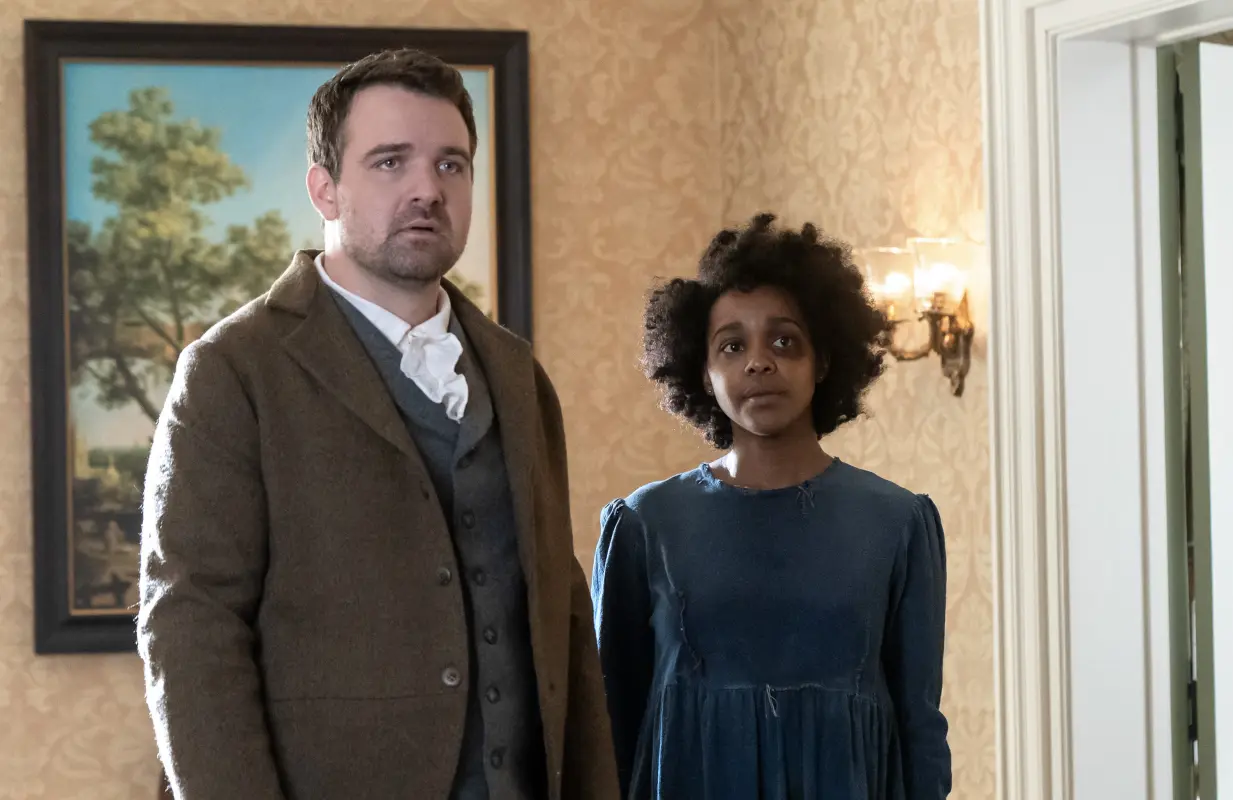FX's Kindred Diminishes a Crucial Part of Octavia Butler’s Novel
-
 Micah Stock and Mallori Johnson in Kindred (Photo: Tina Rowden/FX)
Micah Stock and Mallori Johnson in Kindred (Photo: Tina Rowden/FX)In her essay “The Lost Races of Science Fiction,” Octavia Butler recalls how, in her first year of college, she took a creative writing class in which a professor instructed another student not to use Black characters unless their race was central to the plotline. She heard a similar argument years later at a 1979 science fiction writers convention, when an author decided not to use Black characters because he believed their presence would change the story. He suggested using extraterrestrials as a substitute when dealing with themes of race.
Butler constantly challenged these ideas throughout her career as one of the most renowned writers in her genre. Within a field that was male-dominated and overwhelmingly white, her science fiction opened new worlds that embraced the intersection of race, class, gender, and sexual identity.
In 1979, Butler published Kindred, a novel that has now been adapted into an FX series. The story follows Dana (Mallori Johnson), a modern-day Black woman who finds herself traveling back in time to a pre-Civil War plantation in Maryland. There, she must save and protect Rufus Weylin (David Alexander Kaplan), her white, slavemaster ancestor. This is the kind of story that Butler might have been told never to write, and its enduring success proves she was correct to write it anyway.
Branden Jacobs-Jenkins, the award-winning playwright who serves as the show’s executive producer, adapts the novel by slowing it down. Rather than forcing its entire narrative into eight episodes, he lingers on key, early elements of the story. "It's been about 40 years since the book was released,” he explains in an interview with Entertainment Weekly. “It's about refreshing the themes and asking ourselves how they may have been challenged or expanded upon by the rich evolution of social thought since."
While the main storylines remain intact, Jacobs-Jenkins and his writers’ room have made some noticeable changes. The modern-day timeline has been moved from 1976 to 2016, and while in the book, Dana is a moderately successful writer, in the series she is now an aspiring screenwriter who watches reruns of Dynasty in order to write for a soap opera. The most noticeable change, however, is in her relationship with Kevin (Micah Stock). In the novel, Dana and Kevin, who is white, are a newly married couple when Dana first travels back in time. In the series, Dana meets Kevin in a restaurant, where he works as a waiter.
The series also gives ample time to supporting characters, like the slaveholding family and the slaves on the plantation whom Dana comes to befriend. With each of Dana’s travels back to the past, viewers also witness the daily horrors this plantation enacted. In interviews, Butler, who died in 2006, said part of her reason for writing Kindred was her frustration with Black people in her generation saying they wouldn’t have tolerated the brutality of slavery. As Dana spends more time in the past, she comes to understand that even her intelligence and experiences living as a free Black woman are no match for the devastating systems of oppression faced by those before her. Johnson, in her first leading role, carries the demands of the character with ease, balancing Dana’s strength, naivete, and fighting spirit.
Despite her energy, however, the series itself frequently drags. Dana’s connection to Kevin is especially lackluster. That’s partly due to Stock’s muted performance and his lack of chemistry with Johnson. The bigger problem, however, is the decision to introduce the couple at the very beginning of their relationship. In Butler’s version, Kevin is very much Dana’s equal, and together they reflect the power dynamics of a consensual interracial relationship, as opposed to the Weylins’ non-consensual relationships with the enslaved Black women on their plantation. In the novel, the risks and sacrifices Kevin makes for his wife make sense, because of their love and their bond. In the series, it’s hard to accept that he would do so much for a woman he barely knows. And when Kevin himself eventually gets pulled back into the 19th century, there's a definite ick factor in watching their love story blossom against the backdrop of slavery.
The Weylin family also falls flat. Ryan Kwanten and Gayle Rankin, who play plantation owners Thomas and Margaret, try their best to add depth and dimension to their characters, but the characters hit the familiar notes of abusive anger. It feels like the writers weren’t challenged to tell us anything new about the antebellum South.
It’s too bad that this well-intentioned but underwhelming series is the first major adaptation of an Octavia Butler novel. However, the very fact that Kindred exists is a type of victory. Let’s hope Hollywood invests in more Butler adaptations and in more Black science fiction stories overall.
The entire first season of Kindred is now streaming on Hulu. Join the conversation in our forums.
Rebecca Theodore-Vachon is a tv and film critic whose work has been featured in Harpers Bazaar, Shondaland Magazine and Indiewire. Follow her on Twitter at FilmFatale_NYC.
TOPICS: Kindred, FX, Branden Jacobs-Jenkins, Mallori Johnson , Micah Stock, Octavia Butler